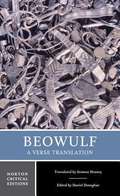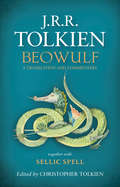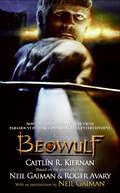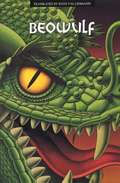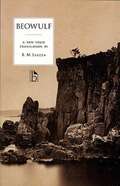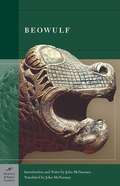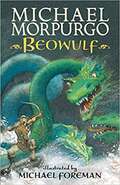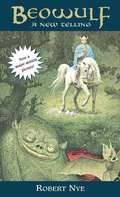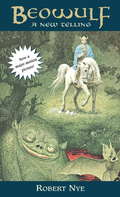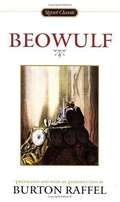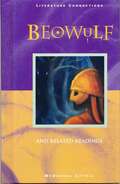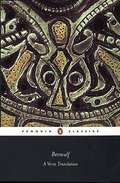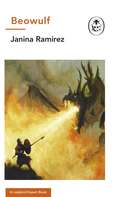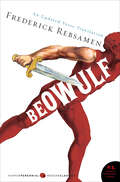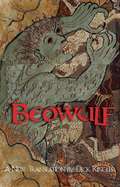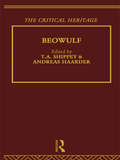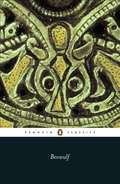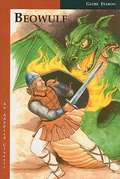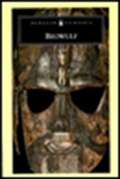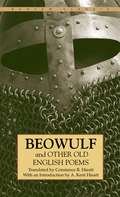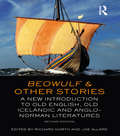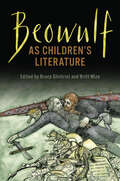- Table View
- List View
Beowulf: A Verse Translation
by Seamus Heaney Daniel DonoghueThe translation that "rides boldly through the reefs of scholarship" (The Observer) is combined with first-rate annotation. No reading knowledge of Old English is assumed. Heaney's clear and insightful introduction to Beowulf provides students with an understanding of both the poem's history in the canon and Heaney's own translation process.
Beowulf: A Translation and Commentary
by J.R.R. TolkienNew York Times bestseller“A thrill . . . Beowulf was Tolkien’s lodestar. Everything he did led up to or away from it.” —New Yorker J.R.R. Tolkien completed his translation of Beowulf in 1926: he returned to it later to make hasty corrections, but seems never to have considered its publication. This edition includes an illuminating written commentary on the poem by the translator himself, drawn from a series of lectures he gave at Oxford in the 1930s. His creative attention to detail in these lectures gives rise to a sense of the immediacy and clarity of his vision. It is as if Tolkien entered into the imagined past: standing beside Beowulf and his men shaking out their mail-shirts as they beach their ship on the coast of Denmark, listening to Beowulf’s rising anger at Unferth’s taunting, or looking up in amazement at Grendel’s terrible hand set under the roof of Heorot. “Essential for students of the Old English poem—and the ideal gift for devotees of the One Ring.” —Kirkus
Beowulf
by Caitlín R. KiernanWho will come to the aid of beleaguered King Hrothgar, whose warriors have become the prey of the vengeful outcast monster Grendel?A grand and glorious story that has endured for centuries, the ageless classic adventure takes on a breathtaking new life in a remarkable new version for a modern era. Brilliantly reimagined by acclaimed, award-winning author Caitlín R. Kiernan, based on the screenplay by #1 New York Times bestseller Neil Gaiman and Academy Award®-winning screenwriter Roger Avary, it is the tale of a noble liege and a terrible creature who has cursed his kingdom with death, blood, and destruction—and of the great hero, Beowulf, who is called to a land of monsters to triumph where so many have failed . . . or to die as so many of the brave before him.
Beowulf: An Imitative Translation
by Ruth P. M. LehmannThe name "Beowulf" lingers in our collective memory, although today fewer people have heard the tale of the Germanic hero's fight with Grendel, the dreadful Monster of the Mere, as recounted in this Anglo-Saxon epic. This edition of Beowulf makes the poem more accessible than ever before. Ruth Lehmann's imitative translation is the only one available that preserves both the story line of the poem and the alliterative versification of the Anglo-Saxon original. The characteristic features of Anglo-Saxon poetry- alliterative verse with first-syllable stress, flexible word order, and inflectional endings-have largely disappeared in Modern English, creating special problems for the translator. Indeed, many other translations of Beowulf currently available are either in prose or in some modern poetic form. Dr. Lehmann's translation alone conveys the "feel" of the original, its rhythm and sound, the powerful directness of the Germanic vocabulary. In her introduction, Dr. Lehmann gives a succinct summary of the poem's plot, touching on the important themes of obligation and loyalty, of family feuds, unforgivable crimes, the necessity of revenge, and the internal and external struggles of the Scandinavian tribes. She also describes the translation process in some detail, stating the guiding principles she used and the inevitable compromises that were sometimes necessary.
Beowulf: Guide Dog for the Blind
by Ernest LewisBeowulf, the Sable German Shepherd, was raised and trained to be a police dog. But when his owner is killed by a smuggler, Beowulf is sold to someone that doesn't understand him. While visiting England his new owner lets him loose, and Beowulf attacks some sheep. The Vickor, Alan Stuard, vows to destroy the sheep killer, and almost succeeds but feels terrible, and agrees to adopt Beowulf and train him. Beowulf learns to be an excellent hunter and pet, and after a terrible accident when Alan goes blind, he learns to become Alan's guide dog. This is a heartwarming story, of a dog, and his love for a master.
Beowulf
by R. M. LiuzzaThe classic story of Beowulf, hero and dragon-slayer, appears here in a new translation accompanied by genealogical charts, historical summaries, and a glossary of proper names. These and other documents sketching some of the cultural forces behind the poem's final creation will help readers see Beowulf as an exploration of the politics of kingship and the psychology of heroism, and as an early English meditation on the bridges and chasms between the pagan past and the Christian present. A generous sample of other modern versions of Beowulf sheds light on the process of translating the poem.
Beowulf
by John McNamaraAll editions are beautifully designed and are printed to superior specifications; some include illustrations of historical interest. Barnes & Noble Classics pulls together a constellation of influences—biographical, historical, and literary—to enrich each reader's understanding of these enduring works. Widely regarded as the first true masterpiece of English literature, Beowulf describes the thrilling adventures of a great Scandinavian warrior of the sixth century. Its lyric intensity and imaginative vitality are unparalleled, and the poem has greatly influenced many important modern novelists and poets, most notably J. R. R. Tolkien, author of The Lord of the Rings. Part history and part mythology, Beowulf opens in the court of the Danish king where a horrible demon named Grendel devours men in their sleep every night. The hero Beowulf arrives and kills the monster, but joy turns to horror when Grendel’s mother attacks the hall to avenge the death of her son. Ultimately triumphant, Beowulf becomes king himself and rules peacefully for fifty years until, one dark day, a foe more powerful than any he has yet faced is aroused—an ancient dragon guarding a horde of treasure. Once again, Beowulf must summon all his strength and courage to face the beast, but this time victory exacts a terrible price.
Beowulf
by Michael Morpurgo Michael ForemanThe acclaimed author and illustrator of SIR GAWAIN AND THE GREEN KNIGHT return with an exhilarating edition of Britain's oldest epic. Long ago there was a Scandinavian warrior who fought three evils so powerful they could destroy whole kingdoms. Standing head and shoulders above his comrades, Beowulf single-handedly saves the land of the Danes from a merciless ogre named Grendel and then from his sea-hag mother. But it is his third terrible battle, with the death-dragon of the deep, in which he truly meets his match. Lovers of heroes, monsters, and the drama of battle will find this retelling as enthralling as it is tragic.
Beowulf: A New Telling
by Robert NyeHe comes out of the darkness, moving in on his victims in deadly silence. When he leaves, a trail of blood is all that remains. He is a monster, Grendel, and all who know of him live in fear. Hrothgar, the king of the Danes, knows something must be done to stop Grendel. But who will guard the great hall he has built, where so many men have lost their lives to the monster while keeping watch? Only one man dares to stand up to Grendel's fury --Beowulf.
Beowulf
by Robert NyeHe comes out of the darkness, moving in on his victims in deadly silence. When he leaves, a trail of blood is all that remains. He is a monster, Grendel, and all who know of him live in fear. Hrothgar, the king of the Danes, knows something must be done to stop Grendel. But who will guard the great hall he has built, where so many men have lost their lives to the monster while keeping watch? Only one man dares to stand up to Grendel's fury --Beowulf.From the Paperback edition.
Beowulf
by Burton RaffelBeowulf is the earliest extant poem in a modern European language-- reflecting a feudal, newly Christian world of heroes and monsters, blood and victory, life and death. Its beauty, power, and artistry have kept it alive for more than thirteen centuries.
Beowulf: And Related Readings (Literature Connections)
by Burton RaffelBeowulf, and Related Readings
Beowulf
by Burton Raffel Roberta Frank AnonymousBeowulf is the earliest extant poem in a modern European language reflecting a feudal, newly Christian world of heroes and monsters, blood and victory, life and death. Its beauty, power, and artistry have kept it alive for more than thirteen centuries.
Beowulf: A Ladybird Expert Book (The Ladybird Expert Series #26)
by Janina RamirezPart of the ALL-NEW LADYBIRD EXPERT SERIES'This accessible illustrated guide is a great introduction to the story, its origins and its enduring legacy' BBC HISTORY- Which is more terrifying - a monster or its mother? - Why did Berserkers run naked into battle? - How was the story of Beowulf almost lost forever?PLUNGE into the adventures of Beowulf, the 6th Century hero who defeated the monster Grendel, became king of his people, and slayed a tremendous dragon. Surviving in a single, burnt manuscript, Beowulf continues to entrance readers and inspire major works of fantasy today.WARRIORS. MONSTERS. DRAGONS. GOLD.Janina Ramirez's Beowulf is an accessible and authoritative guide to the spellbinding world and daring feats of a poem remembered through the centuries.
Beowulf: An Updated Verse Translation (Perennial Classics)
by Frederick RebsamenThe acclaimed verse translation of the timeless epic tale of bravery and battle—the enduring saga of the hero Beowulf and the monster Grendel—the first true masterpiece of English literature.“There are lots of translations of Beowulf floating around, some prose, some poetry, but none manages to capture the feel and tone of the original as well as this one.” — Dick Ringler, Professor of English and Scandinavian Studies, University of Wisconsin-Madison"No self-respecting college professor will want his students to be without it. . . . Renditions in modern English haven't taken the poetry of the original very seriously—but what a shock now that someone has! With the subtle rules of alliteration, stress, and pause in place—and with a translator bold enough to invent his own vigorous and imaginative compound nouns—the poem suddenly takes flight and carries us to the highest mountains of achievement." (Booklist)
Beowulf: A New Translation for Oral Delivery
by Dick RinglerDick Ringler's deceptively simple translation captures the rhythm, movement, and power of the original Old English poem while employing a fluid modern English style and a relatively spare vocabulary. His generous Introduction, a lively yet masterly guide to the work, along with his translations of three shorter Old English poems elucidate a major English text almost as well-known for its subtlety and intricacy as it is for its monsters and heroes.
Beowulf: The Critical Heritage (Critical Heritage Ser.)
by T. A. Shippey Andreas HaarderBeowulf is the oldest and most complete epic poem in any non-Classical European language. Our only manuscript, written in Old English, dates from close to the year 1000. However, the poem remained effectively unknown even to scholars until the year 1815, when it was first published in Copenhagen. This impressive volume selects over one hundred works of critical commentary from the vast body of scholarship on Beowulf - including English translations from German, Danish, Latin and Spanish - from the poem's first mention in 1705 to the Anglophone scholarship of the early twentieth century. Tom Shippey provides both a contextual introduction and a guide to the eighteenth- and nineteenth-century scholarship which generated these Beowulf commentaries. The book is a vital document for the study of one of the major texts of 'the Northern renaissance', in which completely unknown poems and even languages were brought to the attention first of the learned world and then of popular culture. It also acts as a valuable guide to the development of nationalist and racist sentiment, beginning romantically and ending with World War and attempted genocide.
Beowulf: A Translation And Commentary
by J. R. R. Tolkien Christopher TolkienThe translation of Beowulf by J.R.R. Tolkien was an early work, very distinctive in its mode, completed in 1926: he returned to it later to make hasty corrections, but seems never to have considered its publication. This edition is twofold, for there exists an illuminating commentary on the text of the poem by the translator himself, in the written form of a series of lectures given at Oxford in the 1930s; and from these lectures a substantial selection has been made, to form also a commentary on the translation in this book. From his creative attention to detail in these lectures there arises a sense of the immediacy and clarity of his vision. It is as if he entered into the imagined past: standing beside Beowulf and his men shaking out their mail-shirts as they beached their ship on the coast of Denmark, listening to the rising anger of Beowulf at the taunting of Unferth, or looking up in amazement at Grendel's terrible hand set under the roof of Heorot. But the commentary in this book includes also much from those lectures in which, while always anchored in the text, he expressed his wider perceptions. He looks closely at the dragon that would slay Beowulf "snuffling in baffled rage and injured greed when he discovers the theft of the cup"; but he rebuts the notion that this is "a mere treasure story", "just another dragon tale". He turns to the lines that tell of the burying of the golden things long ago, and observes that it is "the feeling for the treasure itself, this sad history" that raises it to another level. "The whole thing is sombre, tragic, sinister, curiously real. The 'treasure' is not just some lucky wealth that will enable the finder to have a good time, or marry the princess. It is laden with history, leading back into the dark heathen ages beyond the memory of song, but not beyond the reach of imagination." Sellic spell, a "marvellous tale", is a story written by Tolkien suggesting what might have been the form and style of an Old English folk-tale of Beowulf, in which there was no association with the "historical legends" of the Northern kingdoms.
Beowulf
by UnknownBeowulf is the greatest surviving work of literature in Old English, unparalleled in its epic grandeur and scope. It tells the story of the heroic Beowulf and of his battles, first with the monster Grendel, who has laid waste to the great hall of the Danish king Hrothgar, then with Grendel's avenging mother, and finally with a dragon that threatens to devastate his homeland. Through its blend of myth and history, Beowulf vividly evokes a twilight world in which men and supernatural forces live side by side. And it celebrates the endurance of the human spirit in a transient world."Alexander's translation is marked by a conviction that it is possible to be both ambitious and faithful [and] ...communicates the poem with a care which goes beyond fidelity-to-meaning and reaches fidelity of implication. May it go on ... to another half-million copies." - Tom Shippey, Bulletin of the International Association of University Professors of English
Beowulf: An Adapted Classic
by Robert VandelThis classic series of plays, novels, and stories has been adapted, in a friendly format, for students reading at a various levels.<P> An excerpt from Beowulf: Out in the darkness, the monster stirred, gliding in shadow. Grendel moved quickly through the cloudy night, lurching up from the swampland. The warriors who were to guard the castle slept -- all but one. Beowulf, wakeful, was on watch for the demon. His anger mounting, he ached for revenge...
Beowulf: A Prose Translation
by David WrightThe greatest surviving Old English poem rendered into modern prose Beowulf stands at the head of English literature; a poem of historical interest and epic scope. Although the first manuscript of Beowulf dates from around the year 1000 CE, it is thought that the poem existed in its present form from the year 850. Beowulf's adventures themselves stand in front of the wide historical canvas of 5th and 6th century Scandinavia. Against this heroic background of feuding and feasting, Beowulf first kills the monster Grendel and her mother, and later defends his people against a dragon in a battle that leaves them both mortally wounded. For more than seventy years, Penguin has been the leading publisher of classic literature in the English-speaking world. With more than 1,700 titles, Penguin Classics represents a global bookshelf of the best works throughout history and across genres and disciplines. Readers trust the series to provide authoritative texts enhanced by introductions and notes by distinguished scholars and contemporary authors, as well as up-to-date translations by award-winning translators.
Beowulf and Other Old English Poems
by Constance HieattUnique and beautiful, Beowulf brings to life a society of violence and honor, fierce warriors and bloody battles, deadly monsters and famous swords. Written by an unknown poet in about the eighth century, this masterpiece of Anglo-Saxton literature transforms legends, myth, history, and ancient songs into the richly colored tale of the hero Beowulf, the loathsome man-eater Grendel, his vengeful water-hag mother, and a treasure-hoarding dragon. The earliest surviving epic poem in any modern European language. Beowulf is a stirring portrait of a heroic world-somber, vast, and magnificent.From the Paperback edition.
Beowulf and Other Stories: A New Introduction to Old English, Old Icelandic and Anglo-Norman Literatures
by Joe Allard Richard NorthBeowulf & Other Stories was first conceived in the belief that the study of Old English – and its close cousins, Old Icelandic and Anglo-Norman – can be a genuine delight, covering a period as replete with wonder, creativity and magic as any other in literature. Now in a fully revised second edition, the collection of essays written by leading academics in the field is set to build upon its established reputation as the standard introduction to the literatures of the time. Beowulf & Other Stories captures the fire and bloodlust of the great epic, Beowulf, and the sophistication and eroticism of the Exeter Riddles. Fresh interpretations give new life to the spiritual ecstasy of The Seafarer and to the imaginative dexterity of The Dream of the Rood, andprovide the student and general reader with all they might need to explore and enjoy this complex but rewarding field. The book sheds light, too, on the shadowy contexts of the period, with suggestive and highly readable essays on matters ranging from the dynamism of the Viking Age to Anglo-Saxon input into The Lord of the Rings, from the great religious prose works to the transition from Old to Middle English. It also branches out into related traditions, with expert introductions to the Icelandic Sagas, Viking Religion and Norse Mythology. Peter S. Baker provides an outstanding guide to taking your first steps in the Old English language, while David Crystal provides a crisp linguistic overview of the entire period. With a new chapter by Mike Bintley on Anglo-Saxon archaeology and a revised chapter by Stewart Brookes on the prose writers of the English Benedictine Reform, this updated second edition will be essential reading for students of the period.
Beowulf as Children’s Literature
by Bruce Gilchrist and Britt MizeThe single largest category of Beowulf representation and adaptation, outside of direct translation of the poem, is children’s literature. Over the past century and a half, more than 150 new versions of Beowulf directed to child and teen audiences have appeared, in English and in many other languages. In this collection of original essays, Bruce Gilchrist and Britt Mize examine the history and processes of remaking Beowulf for young readers. Inventive in their manipulations of story, tone, and genre, these adaptations require their authors to make countless decisions about what to include, exclude, emphasize, de-emphasize, and adjust. This volume considers the many forms of children’s literature, focusing primarily on picture books, illustrated storybooks, and youth novels, but taking account also of curricular aids, illustrated full translations of the poem, and songs. Contributors address issues of gender, historical context, war and violence, techniques of narration, education, and nationalism, investigating both the historical and theoretical dimensions of bringing Beowulf to child audiences.
